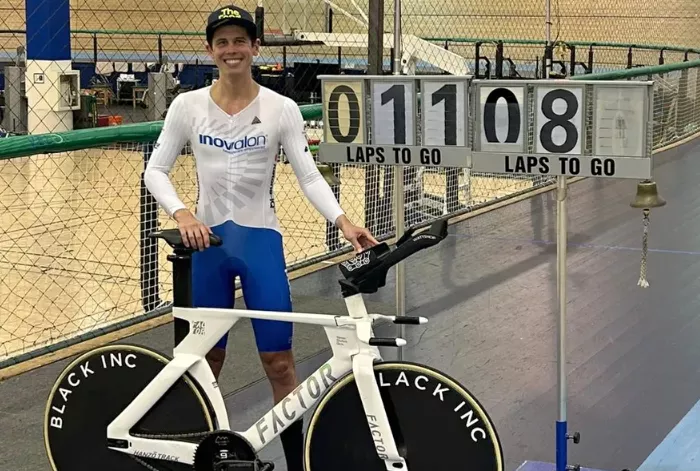Ryan Collins, a former U.S. Olympic hopeful, defied the odds and shattered 12 ultra-cycling world records, proving that resilience can overcome even the most dire predictions.
At the age of 30, Collins’s name is now synonymous with extreme cycling achievements. However, just a few years ago, he was told by doctors that he would never ride a bike again after a life-threatening accident. In 2023 alone, he broke eight records in one year, cementing his place in cycling history.
The journey that led to Collins’s record-breaking feats began after a horrific crash in his early twenties. At the time, Collins was gearing up to join Team USA’s track squad, having been identified as an Olympic prospect. But his dreams were abruptly interrupted when he was struck head-on by a car while training. His injuries were severe, including multiple broken bones and torn ligaments, and he required extensive reconstructive surgery.
When the surgery was over, the prognosis was grim. The doctor’s words, “You’re never going to ride a bike again,” left Collins devastated. But for the determined cyclist, the challenge was clear: prove them wrong. “When someone tells you you’re never going to do something, it’s like, ‘Who are you to tell me that? Just watch me,’” Collins recalls.
In the months following his accident, Collins made gradual progress, rebuilding his strength until he could once again grip the handlebars, shift gears, and brake. Within less than a year, he competed in a 12-hour ultra-cycling event in Florida, where he exceeded expectations. By the following year, he returned to win, setting a new course record and sparking his ambition to take on even bigger challenges.
By 2020, just two years after the crash, Collins set his first world records, including the fastest times for six-hour outdoor cycling and the 100km and 200km distances. Last January, he targeted a fresh set of records, focusing on the track and indoor cycling. His dedication to the six-hour challenge, which became his signature event, was driven by promises he had made to friends who had struggled with depression and ultimately lost their battles. He felt compelled to honor them by achieving these ambitious goals.
Although Collins describes six hours on the bike as “a long training ride,” he acknowledges the difficulty of maintaining an optimal position for such an extended period. His grueling training routine involved waking up at 4 a.m. to ride on a turbo trainer for two to three hours before heading to his marketing job in New Jersey. “The biggest success came from the isolation on the indoor trainer,” he says, “sitting there with no fans, hot, grueling, boring, staring at a wall—occasionally playing music unless I got a noise complaint.”
Collins’s training wasn’t confined to physical endurance. He relied heavily on his cycling equipment to improve his performance. Partnering with experts in aerodynamics, he used cutting-edge gear like Rule 28 kit, a cockpit from aero specialists Wattshop, and the Factor Hanzo track bike—a machine that debuted with a hefty price tag of $59,990.
In September 2023, Collins made his first attempt to break the six-hour record at an outdoor velodrome in San Diego. Despite uncertainties about his ability to ride for six hours, he managed to exceed expectations, covering 259km (161 miles) and setting four new records. His success at the outdoor track set the stage for an even more demanding challenge: the six-hour indoor velodrome event in December.
Traveling across the country to California, Collins faced the challenge of riding on the only Olympic-distance indoor track in the U.S., located in Carson, Los Angeles. Despite the distance from his East Coast home in Washington D.C., Collins was focused and determined. Once on the track, he entered a “flow state,” a mental zone where time seemed to pass effortlessly as he pushed his body to its limits.
“I didn’t space out, but I could think about anything, and time passed so quickly,” he explains. With a precise fueling strategy and the rhythm of his pedaling, he maintained an average speed of nearly 29mph (46km/h), eventually completing 1,108 laps and setting another four world records.
Reflecting on his achievements, Collins shared a message of triumph on Instagram, “I did it.” His journey from the doctor’s diagnosis to world-record holder is a testament to the power of focus, rehabilitation, and an unwavering commitment to recovery.
“Looking back, that crash in my early twenties was just the beginning,” Collins says. “It goes to show what you can do when you focus and put everything into rehabilitation recovery. I did everything I possibly could to do it safely and correctly, and here we are.”
Collins’s story is a powerful reminder that setbacks do not define us—they can propel us toward even greater achievements.
Related topics
- Hessmann to Join Movistar After Doping Suspension Ends
- Common Shark Species Found Near Popular Surf Spots
- Surf Community Unites in Massive Los Angeles Fire Relief Effort

